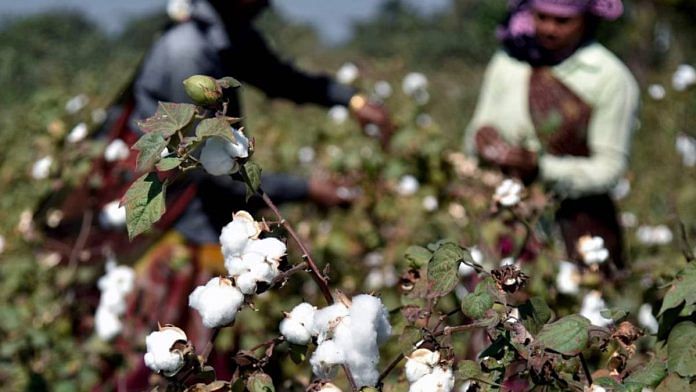Chandigarh: Finding it difficult to meet the government’s standards for certification of cotton bales, cotton ginners — those who separate cotton from its seed and press it into bales of 170kg each — from Punjab, Haryana, and Rajasthan have threatened to shut their units from September, the deadline for compliance.
Without the BIS (Bureau of Indian Standards) certification, cotton bales cannot be produced, sold, imported or exhibited, according to the BIS Act, 2016.
Approving the Quality Control Order for cotton on 22 February this year, which was notified on 1 March, Union textile minister Piyush Goyal had said that a quality check for cotton would be beneficial for farmers as well as the industry.
The 1 March government notification mandates compliance with the BIS certification norms after 180 days i.e, 1 September. Ginners have to obtain a licence for standard mark by self-certifying that their bales are meeting certain parameters, including staple length, percentage of trash, moisture content, actual strength and micronaire (a measure of air permeability), and uniformity in pressed bales dimensions.
They need to then submit their own report along with a sample to the BIS which will then issue licences. ThePrint has a copy of the order.
Non-compliance for the first time attracts a fine not less than Rs 2 lakh and imprisonment which may extend up to two years, under the provisions of the BIS Act, 2016.
While the order is aimed at preventing sub-standard produce from entering the market, cotton ginners say they only process cotton they get from farmers, they aren’t producers.
They also point out that the climate in Haryana, Punjab and Rajasthan is different from other cotton-producing states such as Gujarat and Maharashtra, but the government is applying the same rules for the cotton produced across the country.
Speaking to ThePrint Friday, Sushil Mittal, president of the Haryana Cotton Ginners Association, enumerated the standards set for various lengths of cotton staple, including trash and moisture content.
“In Haryana, Punjab and Rajasthan, the temperature is around 45 degrees Celsius when the farmers sow cotton in April-end and May. By the time the crop is harvested, in September-October, the temperature is 25-35 degrees Celsius.”
“The mercury further dips to 10 degrees Celsius or less, with fog, when we do the pressing and baling in our units from November onwards,” said Mittal. He said it was not possible to maintain the standard of moisture content below the stipulated 8 per cent under these conditions.
He said the ginners associations of the three states have written to Union minister Goyal, requesting him to relax the norms for them. ThePrint has a copy of the undated letter.
“We have requested the minister to relax the moisture content norm to 9.5 per cent from 8 per cent and trash content to 4.5 per cent from 3 per cent for the northern states, because our inability to adhere to the BIS norms is not because of any laxity at our level but because of conditions beyond our control, he said, adding, “We have also submitted to the minister that in case we don’t get a relief, we will have to shut units.”
ThePrint could not connect with J.K. Gupta, scientist E and head, Textiles, in the Bureau of Indian Standards as he was on leave. This report will be updated once a response is received from the BIS.
Also read: India’s most popular export variety of Basmati to be phased out. Farmers hopeful, exporters anxious
‘Some parameters can be met’
Gurpreet Singh Nagpal, general secretary of Sirsa District Cotton Industries Association, said the government move will throttle micro, small and medium enterprises as smaller units will find it hard to comply with the norms because of lack of necessary infrastructure. This, he said, may push the business into the hands of bigger players, leading to exploitation of farmers.
Meanwhile, Dr Dilip Monga, a former head of the Central Institute for Cotton Research (CICR), a Sirsa-based institute of the Indian Council of Agriculture Research (ICAR), agreed with the ginners’ plea. Speaking to ThePrint, he said different climatic conditions made it difficult for Haryana, Rajasthan, and Punjab to comply with the norms set for the BIS certification.
Speaking to ThePrint Friday, he said the climatic conditions affect moisture content alone but factors such as trash and contamination can be controlled, both at the ginners’ and the farmers’ level.
“It is common knowledge in the trade that a cotton bale from Gujarat or Maharashtra is as white as milk from the inside. But the ones from the northern states contain trash as well as contamination.”
He said the trash comes in the form of leaves or other parts of the cotton plant due to poor cleaning at the farmers’ or ginners’ level, contamination includes synthetic materials, hair, threads of plastic bags used for packing.
“Women who pluck cotton in Maharashtra, Gujarat and Madhya Pradesh and southern states such as Telangana, Andhra Pradesh, Karnataka, and Tamil Nadu use headgear during the process. There is no such culture in Punjab, Haryana, and Rajasthan,” Monga said.
Sushil Phutela of Bhagwati Cotton Mills, Bathinda, and a former vice-president of Punjab Cotton Industries Association told ThePrint that with penal provisions, including jail term, ginners would rather close their firms than take a risk.
Balwant Rai, president of Alwar District Cotton Ginners Association, alleged that the government was rushing to implement the 1 March order without putting a proper infrastructure in place for testing moisture, trash, staple length and other parameters.
“Our association has requested the textile ministry through a letter that till the time neutral labs acceptable to both the sellers and buyers are set up, the parameters for moisture contents, trash etc., should not be implemented,” Rai said to ThePrint Friday.
(Edited by Smriti Sinha)
Also read: ‘BJP preparing to contest all 10 LS seats, so is JJP,’ says Haryana deputy CM Dushyant Chautala



